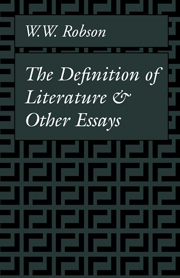Book contents
- Frontmatter
- Contents
- Preface
- Bibliographical note
- 1 The Definition of Literature
- 2 On Liberty of Interpreting
- 3 Evaluative Criticism, and Criticism without Evaluation
- 4 The Novel: a Critical Impasse?
- 5 The Sea Cook: a Study in the Art of Robert Louis Stevenson
- 6 On Kidnapped
- 7 On The Wind in the Willows
- 8 The Present Value of Tennyson
- 9 Robert Frost
- 10 Hopkins and Literary Criticism
- 11 T. S. Eliot: a Poet's Notebook
- 12 I. A. Richards
- 13 Yvor Winters: Counter-romantic
4 - The Novel: a Critical Impasse?
Published online by Cambridge University Press: 01 June 2011
- Frontmatter
- Contents
- Preface
- Bibliographical note
- 1 The Definition of Literature
- 2 On Liberty of Interpreting
- 3 Evaluative Criticism, and Criticism without Evaluation
- 4 The Novel: a Critical Impasse?
- 5 The Sea Cook: a Study in the Art of Robert Louis Stevenson
- 6 On Kidnapped
- 7 On The Wind in the Willows
- 8 The Present Value of Tennyson
- 9 Robert Frost
- 10 Hopkins and Literary Criticism
- 11 T. S. Eliot: a Poet's Notebook
- 12 I. A. Richards
- 13 Yvor Winters: Counter-romantic
Summary
The problem for discussion is this. There are two typical views, or theories, about the Novel – call them A and B. In theories of type A the Novel is given the high value, significance and importance which its admirers wish it to have. But when this view is spelt out explicitly it seems to be vitiated by an internal contradiction. A theory of type B is logically coherent; but it seems to deprive the Novel of serious interest. (I shall presently explain what these theories are.)
This problem only arises for those who claim a high standing for the Novel. Many, of course, do not read novels at all, and many more enjoy them only as light entertainment. But expressions like ‘major fiction’ are accepted. The publishers' advertisement for a reprint of Owen Wister's The Virginian (1902) speaks of its ‘lasting appeal for readers of serious fiction as well as lovers of Western genre fiction’. The Novel is no longer an outlaw on Parnassus. However meagre may be the novelist's financial reward for his work, however unintelligently it may be treated by the ‘irresponsible, indolent reviewers’, he has at least the satisfaction (for what that is worth) of knowing that the art he practises has the support of a respected convention. This was not always so. The English novel began as a rather disreputable form of sub-literature, and there are still traces here and there of the old prejudices against fiction.
- Type
- Chapter
- Information
- The Definition of Literature and Other Essays , pp. 57 - 78Publisher: Cambridge University PressPrint publication year: 1982



